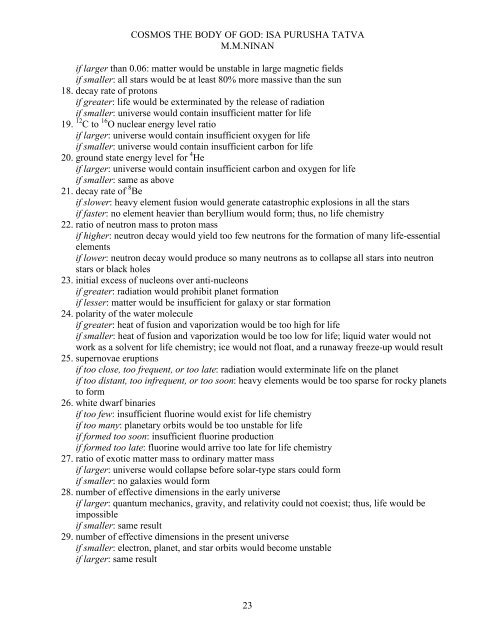You also want an ePaper? Increase the reach of your titles
YUMPU automatically turns print PDFs into web optimized ePapers that Google loves.
COSMOS THE BODY OF GOD: ISA PURUSHA TATVA<br />
M.M.NINAN<br />
if larger than 0.06: matter would be unstable in large magnetic fields<br />
if smaller: all stars would be at least 80% more massive than the sun<br />
18. decay rate <strong>of</strong> protons<br />
if greater: life would be exterminated by the release <strong>of</strong> radiation<br />
if smaller: universe would contain insufficient matter for life<br />
19. 12 C to 16 O nuclear energy level ratio<br />
if larger: universe would contain insufficient oxygen for life<br />
if smaller: universe would contain insufficient carbon for life<br />
20. ground state energy level for 4 He<br />
if larger: universe would contain insufficient carbon and oxygen for life<br />
if smaller: same as above<br />
21. decay rate <strong>of</strong> 8 Be<br />
if slower: heavy element fusion would generate catastrophic explosions in all the stars<br />
if faster: no element heavier than beryllium would form; thus, no life chemistry<br />
22. ratio <strong>of</strong> neutron mass to proton mass<br />
if higher: neutron decay would yield too few neutrons for the formation <strong>of</strong> many life-essential<br />
elements<br />
if lower: neutron decay would produce so many neutrons as to collapse all stars into neutron<br />
stars or black holes<br />
23. initial excess <strong>of</strong> nucleons over anti-nucleons<br />
if greater: radiation would prohibit planet formation<br />
if lesser: matter would be insufficient for galaxy or star formation<br />
24. polarity <strong>of</strong> the water molecule<br />
if greater: heat <strong>of</strong> fusion and vaporization would be too high for life<br />
if smaller: heat <strong>of</strong> fusion and vaporization would be too low for life; liquid water would not<br />
work as a solvent for life chemistry; ice would not float, and a runaway freeze-up would result<br />
25. supernovae eruptions<br />
if too close, too frequent, or too late: radiation would exterminate life on the planet<br />
if too distant, too infrequent, or too soon: heavy elements would be too sparse for rocky planets<br />
to form<br />
26. white dwarf binaries<br />
if too few: insufficient fluorine would exist for life chemistry<br />
if too many: planetary orbits would be too unstable for life<br />
if formed too soon: insufficient fluorine production<br />
if formed too late: fluorine would arrive too late for life chemistry<br />
27. ratio <strong>of</strong> exotic matter mass to ordinary matter mass<br />
if larger: universe would collapse before solar-type stars could form<br />
if smaller: no galaxies would form<br />
28. number <strong>of</strong> effective dimensions in the early universe<br />
if larger: quantum mechanics, gravity, and relativity could not coexist; thus, life would be<br />
impossible<br />
if smaller: same result<br />
29. number <strong>of</strong> effective dimensions in the present universe<br />
if smaller: electron, planet, and star orbits would become unstable<br />
if larger: same result<br />
23


















